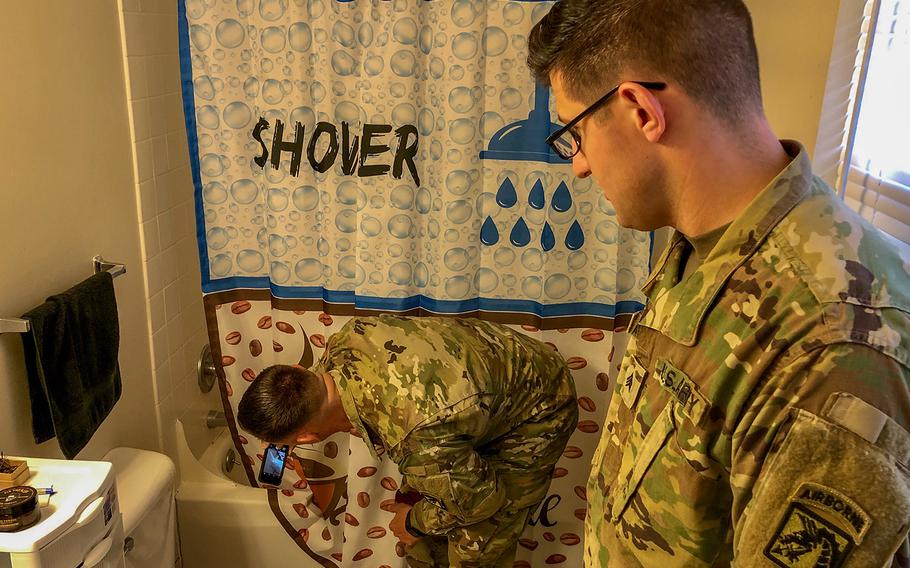
First Sgt. Jeremy Crisp, left, senior enlisted advisor of the 22nd Mobile Public Affairs Detachment, Headquarters and Headquarters Battalion, XVIII Airborne Corps, conducts a command visit with Sgt. Andrew McNeil on Fort Bragg, N.C., on April 5, 2019. Crisp wanted to document maintenance issues and to help ensure McNeil's housing issues would be addressed properly. (Gregory T. Summers/U.S. Army)
WASHINGTON — Army families are less satisfied with living conditions in on-post housing than they were last year, according to a pair of surveys that service officials sent out in January as they work to address ongoing problems reported in residences run by private management companies.
Overall satisfaction rates dropped about six percentage points from 2018 among residents living in privatized, on-post housing to a 74.6% approval rate, according to the survey of Army families living on 43 stateside installations. The second survey, which sought input from residents living in Army-run dwellings at 23 installations worldwide, showed satisfaction rates drop slightly to a 70.3% satisfaction rate, a drop of 1.2 percentage points from 2018.
The surveys, published late Thursday, were distributed by the Army but administered by CEL & Associates Inc., an independent organization that has also conducted housing surveys for the other military branches and in the private sector. The surveys were sent to about 100,000 Army families, though only slightly more than 25,000 responded.
CEL surveyors blamed the diminishing scores largely on declining satisfaction with maintenance, home conditions and services provided by landlords, the reports stated. Others were dissatisfied with the value of the home that they were provided for the cost.
They also blamed satisfaction rate decreases on increased media attention to issues plaguing privatized, on-post housing. Since last year, news reports have detailed major problems in privately run military housing, including vermin infestations, rampant mold outbreaks, sewage leaks and slow maintenance response times. The issues have since been examined by Congress. Top civilian and uniformed leaders in the Pentagon have pledged to fix it.
“The score declines appear to be a combination of growing dissatisfaction at some locations coupled with a greater sense of dissatisfaction upon learning that other residents had similar or greater issues,” the report on the privatized Army housing survey reads. “Residents noted the media reports and cited partner profits which could also have contributed to the downward trend in resident sentiment.”
Housing on Fort Greely in Alaska, owned by Lendlease Corporation, scored the top marks among Army privatized housing locations, with an 89% overall satisfaction rate. It was one of three locations that achieved a rate more than 85%, including Fort Huachuca in Arizona and Picattiny Arsenal in New Jersey.
Privatized housing on Fort Bragg in North Carolina, run by Corvias Military Living, scored the lowest marks with a 58.9% overall satisfaction rate. Private housing at Fort Carson in Colorado and Fort Meade in Maryland also received poor ratings, below 65% satisfaction among survey-takers.
Army officials noted the service has taken steps to address the problems that surfaced in recent months since the survey was distributed. The service has held town hall meetings at all of its installations for residents to voice publicly their concerns to leadership. Additionally, Army officials have taken the lead among the military services in meeting with landlord companies and forging new agreements meant to empower residents.
"We are absolutely committed to providing safe and secure housing on every installation," said Army Gen. Gus Perna, the chief of Army Materiel Command. "We are taking action to earn back the trust of our housing residents, and holding ourselves and privatized housing companies accountable to provide a high-quality standard of living."
While Pentagon leadership has worked to address the problems reported at installations across the world and spanning all of the military services, problems with the management companies have continued to surface.
The Air Force announced this week that it was withholding incentive payments of some $4.3 million from Balfour Beatty Communities, LLC as it investigates allegations that employees from at least two bases submitted fraudulent maintenance logs to service officials that incorrectly showed needed work had been completed. Balfour Beatty officials said accused employees had been suspended amid internal investigations into the complaints and promised to work with the Air Force to ensure the matters were resolved properly.
Balfour Beatty is among the largest private military housing companies. It runs housing for all of the services, including at sixteen Army posts in the United States. The 2019 housing survey showed 70.6 percent of residents living in Balfour Beatty dwellings reported satisfactory living conditions, a 6.1 percentage point drop from 2018.
Lawmakers in a series of Capitol Hill hearings have heard extensively from military leadership, on-base housing companies and from tenants about the issues and plans to address them.
House and Senate versions of the 2020 National Defense Authorization Act, the annual law that sets military policy, have incorporated legislation aimed at fixing private military housing problems. Top lawmakers have vowed severe repercussions if the issues are not solved in the near future.
dickstein.corey@stripes.com Twitter: @CDicksteinDC